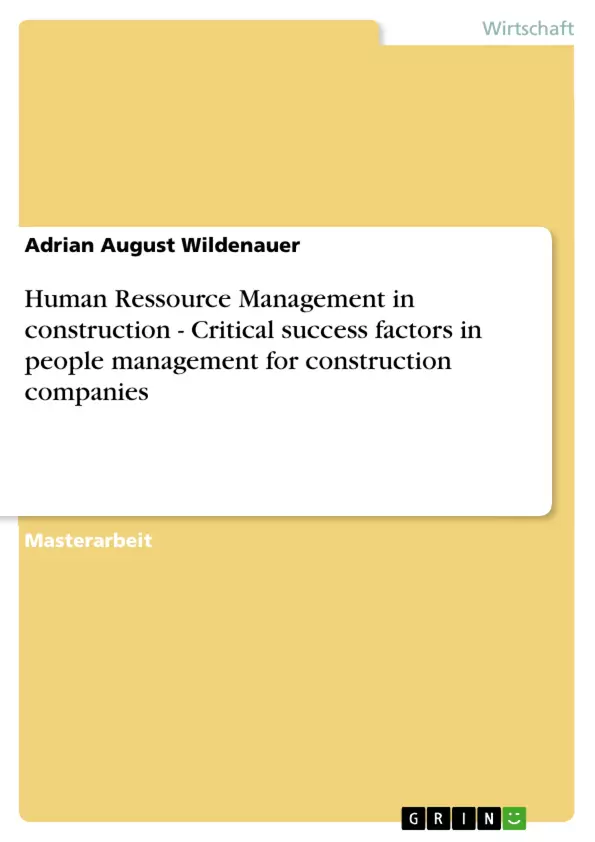ABSTRACT
Many construction organisations promote their "soft" approach to Human Resource Management
in company brochures and annual reports. This style focuses on treating employees as highly valued
assets and a major source of their competitive advantage.
Advocates of this application of HRM argue that this way leads to a seamless company, improved
employer-employee relations and greater efficiency. Critics argue that these techniques are not new
methods. Nevertheless, reality shows that there is a gap between rhetoric and reality. Organisational
reality appears "hard" with an emphasis on the quantitative, calculative and strategic aspects of managing
people.
In order to explore the importance of Human Resource Management in the construction industry
and to illustrate the gaping disparity between theory and practice, this study is based on the findings
of broad-spectrum interviews and questionnaires.
Results have shown that a majority of construction companies have an in-house HRM department.
This number was the highest in medium-sized companies. In corporations with a HRM department,
employees were more satisfied with the overall situation and better motivated.
Another finding is the relatively low amount of training. This reflects the trend towards the outsourcing
of work to specialised sub-contractors. However, some companies fear that their subcontractors
are not qualified enough and demand more training from them.
Another result showed that monetary remuneration is not the single key motivator for employees
in this business. Social empowerment and managerial recognition both scored highly as motivating
factors.
Induction seminars for new employees are no longer considered important to construction professionals.
Teamwork within the industry is seen as vital but should be improved and further developed.
However, this study found the application of HRM principles not to be a prerequisite. Some companies
apply little or no HRM principles and yet, they are still successful. Further research is required
to explore the consequences of this gap for organisations and employees.
The findings of this study support the demand for increased practices of empowerment, higher involvement
of employees in decision-making and improved communication in all levels of the hierarchy
and training.
Inhaltsverzeichnis
- ABSTRACT
- ABSTRAKT
- PREFACE
Zielsetzung und Themenschwerpunkte
Diese Dissertation befasst sich mit der Bedeutung von Human Resource Management (HRM) in der Baubranche und untersucht, wie sich HRM-Prinzipien auf den Erfolg von Bauunternehmen auswirken. Die Arbeit analysiert die Kluft zwischen Theorie und Praxis von HRM in der Konstruktion und untersucht, welche Faktoren für die erfolgreiche Integration von Personalmanagement in Bauunternehmen entscheidend sind.
- Die Bedeutung von HRM in der Baubranche
- Die Kluft zwischen Theorie und Praxis von HRM in der Konstruktion
- Kritische Erfolgsfaktoren für HRM in Bauunternehmen
- Die Rolle von Mitarbeitermotivation und -zufriedenheit
- Die Auswirkungen von HRM auf die Wettbewerbsfähigkeit von Bauunternehmen
Zusammenfassung der Kapitel
- ABSTRACT/ABSTRAKT: Die Einleitung der Dissertation skizziert die Relevanz von HRM in der Bauindustrie und beleuchtet die Diskrepanz zwischen theoretischen Ansätzen und praktischer Umsetzung. Sie stellt die Forschungsmethode der Studie vor, die auf Interviews und Fragebögen basiert.
- PREFACE: Die Einleitung stellt die Motivation und den Hintergrund der Dissertation dar. Sie beleuchtet die Herausforderungen der Bauindustrie, insbesondere im Kontext von Unternehmenszusammenbrüchen, Preiswettbewerben und den Auswirkungen des europäischen Binnenmarktes. Sie hinterfragt die Rolle von HRM bei der Steigerung der Produktivität und der Verbesserung des Arbeitsklimas.
Schlüsselwörter
Human Resource Management, Bauindustrie, Erfolgsfaktoren, Mitarbeitermotivation, Mitarbeiterzufriedenheit, Wettbewerbsfähigkeit, Theorie und Praxis, Preiswettbewerb, Outsourcing, Teamwork, Mitarbeiterbeteiligung, Entscheidungsfindung, Kommunikation, Fortbildung, Ausbildung.
- Quote paper
- M.Sc. ECM Adrian August Wildenauer (Author), 2003, Human Ressource Management in construction - Critical success factors in people management for construction companies, Munich, GRIN Verlag, https://www.grin.com/document/52236



